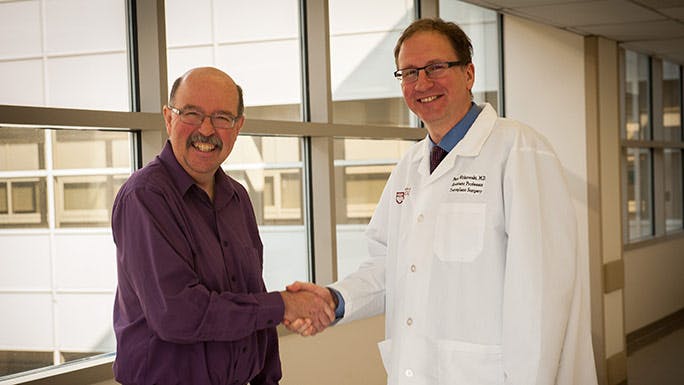Pancreatic islet transplant allows patient with brittle type 1 diabetes to become insulin-free

On his 56th birthday, Mark Morrison had cake with frosting for the first time in 40 years.
"Yellow cake with chocolate frosting," said the resident from Crest Hill, Ill. "I topped it with two scoops of ice cream, one vanilla and one chocolate."
In 2014, just a few months before that sweet birthday, Morrison, who struggled with type 1 diabetes for most of his life, underwent a pancreatic islet transplant at the University of Chicago Medicine. The experimental procedure, a promising treatment for patients with unstable type 1 diabetes, is undergoing clinical trials at select centers in the United States, Canada and Europe.
During the transplant, islet cells from the pancreas of a deceased donor are infused into a major blood vessel of the recipient’s liver. The liver provides the robust blood supply needed for islets to engraft, so they can start making and releasing insulin.
Twenty days after transplant, Mark no longer needed insulin injections.
Transplant surgeon Piotr Witkowski, MD, PhD, director of pancreas and islet transplantation said Morrison’s donor islets started reproducing within a few days. "By 20 days after transplant, Mark no longer needed insulin injections," Witkowski said. Morrison added, "The islets are doing great."
The importance of islets
Islets are tiny clusters of cells found in the pancreas. Pancreatic islets contain several kinds of cells, including insulin-producing beta cells. Insulin helps the body control blood sugar (glucose). Type 1 diabetes is an autoimmune disorder in which the body attacks and destroys beta cells. Patients with the disease must take daily insulin in order to live.
In some cases, patients with type 1 diabetes have episodes of severe blood sugar swings despite careful diet and insulin injections. This instability is referred to as brittle, or labile, diabetes. The condition can lead to other serious medical problems, including seizures, hormonal imbalances, quality-of-life issues and shortened life expectancy.
Morrison was diagnosed with type 1 diabetes in 1974, when he was 16 years old. He did what he could to manage, but often had difficulty controlling his blood sugar. Two years ago, he started having swings in glucose levels that came on without warning. His insulin pump sensor went off as many as six or seven times a day. "My blood sugar was changing faster than I could read the meter," he said. Morrison went on the list for a whole pancreas transplant.
Increasing effectiveness, optimizing results
While waiting for the organ, Morrison read about islet transplant studies at the University of Chicago Medicine. The medical center has been at the forefront of refining this treatment since it began conducting clinical trials in 2004. Twenty patients with brittle diabetes have been transplanted.
As with whole organ transplant, patients who receive donated islets need to take immunosuppressive drugs to prevent rejection. "Over the years, we have improved the medications for immunosuppression," Witkowski said. "However, many patients needed more than one transplant in order to get enough functioning islets for regulation of blood glucose levels."
Morrison describes the change in his life since the transplant as 'unbelievable.'
In 2013, Witkowski initiated a clinical trial testing an anti-inflammatory medication that may boost donor islet survival during and after infusion. The University of Chicago Medicine was the only site in the United States participating in the international multicenter trial. The study showed promising results. Several patients were able to stop taking insulin completely, including Morrison, who became insulin free after one islet infusion.
"The anti-inflammatory medication seems to give improved results," Witkowski said. "We continue to enroll patients in the study and collect data to evaluate the long-term risks and benefits of the procedure." Witkowski believes islet transplant will not only help diabetics with brittle disease but eventually also offer a cure to every patient with type 1 diabetes.
Morrison describes the change in his life since the transplant as "unbelievable." Other health problems he had when he was diabetic — retinopathy, neuropathy, blood vessel damage — are in check. After the transplant, Morrison became more physically active and started running. He recently completed his first half marathon.
"When I was in younger, I thought maybe I’d live until age 65," he said. "Today, I look forward to many more decades of life."
Pancreatic islet transplants
UChicago Medicine is one of the few hospitals in the country performing islet transplants. Islet transplants are intended to treat advanced Type 1 diabetes by replacing destroyed islets with new ones.
Learn about our transplant program
Piotr Witkowski, MD, PhD
Dr. Witkowski is a leading expert in islet transplantation. He was instrumental in developing an optimized islet isolation technique that greatly improved success in clinical transplants.
Learn more about Dr. Witkowski